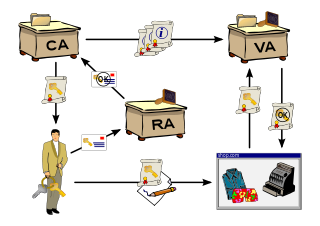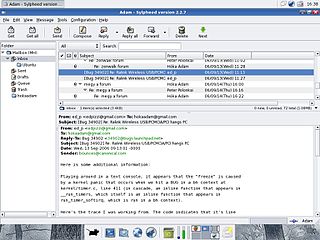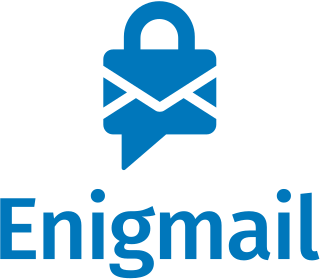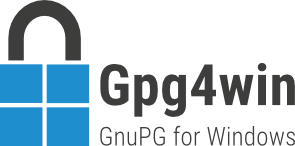Pretty Good Privacy (PGP) is an encryption program that provides cryptographic privacy and authentication for data communication. PGP is used for signing, encrypting, and decrypting texts, e-mails, files, directories, and whole disk partitions and to increase the security of e-mail communications. Phil Zimmermann developed PGP in 1991.
A cypherpunk is any individual advocating widespread use of strong cryptography and privacy-enhancing technologies as a route to social and political change. Originally communicating through the Cypherpunks electronic mailing list, informal groups aimed to achieve privacy and security through proactive use of cryptography. Cypherpunks have been engaged in an active movement since at least the late 1980s.

GNU Privacy Guard is a free-software replacement for Symantec's PGP cryptographic software suite. The software is compliant with RFC 4880, the IETF standards-track specification of OpenPGP. Modern versions of PGP are interoperable with GnuPG and other OpenPGP-compliant systems. GnuPG is however expected to break compliance with the upcoming revision of OpenPGP and thus with other implementatios that will continue to comply.

A public key infrastructure (PKI) is a set of roles, policies, hardware, software and procedures needed to create, manage, distribute, use, store and revoke digital certificates and manage public-key encryption. The purpose of a PKI is to facilitate the secure electronic transfer of information for a range of network activities such as e-commerce, internet banking and confidential email. It is required for activities where simple passwords are an inadequate authentication method and more rigorous proof is required to confirm the identity of the parties involved in the communication and to validate the information being transferred.

Sylpheed is an open-source e-mail client and news client licensed under GNU GPL-2.0-or-later with the library part LibSylph under GNU LGPL-2.1-or-later. It provides easy configuration and an abundance of features. It stores mail in the MH Message Handling System. Sylpheed runs on Unix-like systems such as Linux or BSD, and it is also usable on Windows. It uses GTK+.

Enigmail is a data encryption and decryption extension for Mozilla Thunderbird and the Postbox that provides OpenPGP public key e-mail encryption and signing. Enigmail works under Microsoft Windows, Unix-like, and Mac OS X operating systems. Enigmail can operate with other mail clients compatible with PGP/MIME and inline PGP such as: Microsoft Outlook with Gpg4win package installed, Gnome Evolution, KMail, Claws Mail, Gnus, Mutt. Its cryptographic functionality is handled by GNU Privacy Guard.
In cryptography, Camellia is a symmetric key block cipher with a block size of 128 bits and key sizes of 128, 192 and 256 bits. It was jointly developed by Mitsubishi Electric and NTT of Japan. The cipher has been approved for use by the ISO/IEC, the European Union's NESSIE project and the Japanese CRYPTREC project. The cipher has security levels and processing abilities comparable to the Advanced Encryption Standard.
S/MIME is a standard for public-key encryption and signing of MIME data. S/MIME is on an IETF standards track and defined in a number of documents, most importantly RFC 8551. It was originally developed by RSA Data Security, and the original specification used the IETF MIME specification with the de facto industry standard PKCS #7 secure message format. Change control to S/MIME has since been vested in the IETF, and the specification is now layered on Cryptographic Message Syntax (CMS), an IETF specification that is identical in most respects with PKCS #7. S/MIME functionality is built into the majority of modern email software and interoperates between them. Since it is built on CMS, MIME can also hold an advanced digital signature.
The device mapper is a framework provided by the Linux kernel for mapping physical block devices onto higher-level virtual block devices. It forms the foundation of the logical volume manager (LVM), software RAIDs and dm-crypt disk encryption, and offers additional features such as file system snapshots.
The OpenBSD operating system focuses on security and the development of security features. According to author Michael W. Lucas, OpenBSD "is widely regarded as the most secure operating system available anywhere, under any licensing terms."
Zfone is software for secure voice communication over the Internet (VoIP), using the ZRTP protocol. It is created by Phil Zimmermann, the creator of the PGP encryption software. Zfone works on top of existing SIP- and RTP-programs, but should work with any SIP- and RTP-compliant VoIP-program.

FreeBSD is a free and open-source Unix-like operating system descended from the Berkeley Software Distribution (BSD). The first version of FreeBSD was released in 1993 developed from 386BSD and the current version runs on x86, ARM, PowerPC and RISC-V processors. The project is supported and promoted by the FreeBSD Foundation.
cryptlib is an open-source cross-platform software security toolkit library. It is distributed under the Sleepycat License, a free software license compatible with the GNU General Public License. Alternatively, cryptlib is available under a proprietary license for those preferring to use it under proprietary terms.
This is a technical feature comparison of different disk encryption software.

WinPT or Windows Privacy Tray is frontend to the Gnu Privacy Guard (GnuPG) for the Windows platform. Released under GPL, it is compatible with OpenPGP compliant software.
Email encryption is encryption of email messages to protect the content from being read by entities other than the intended recipients. Email encryption may also include authentication.

Gpg4win is an email and file encryption package for most versions of Microsoft Windows and Microsoft Outlook, which utilises the GnuPG framework for symmetric and public-key cryptography, such as data encryption, digital signatures, hash calculations etc.

GhostBSD is a Unix-like operating system based on FreeBSD, with MATE as its default desktop environment and an Xfce-desktop community based edition. It aims to be easy to install, ready-to-use and easy to use. The project goal is to combine security, privacy, stability, usability, openness, freedom and to be free of charge.

Pretty Easy privacy was a pluggable data encryption and verification system which provides automatic cryptographic key management through a set of libraries for written digital communications.








